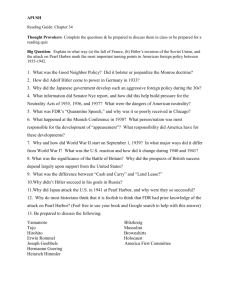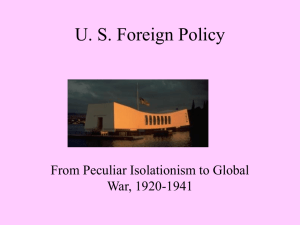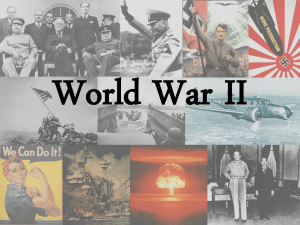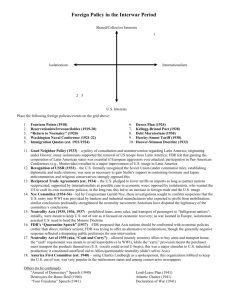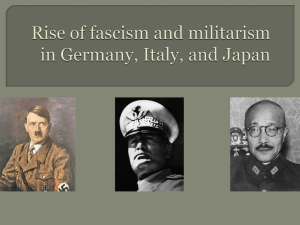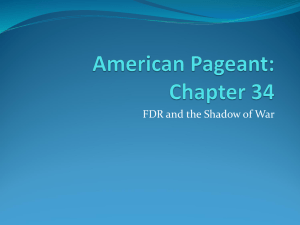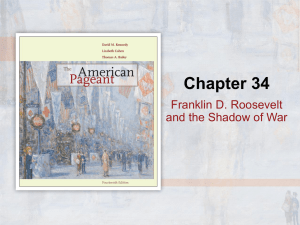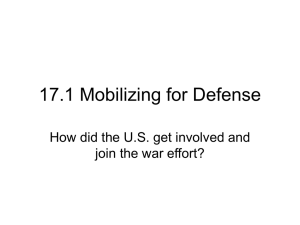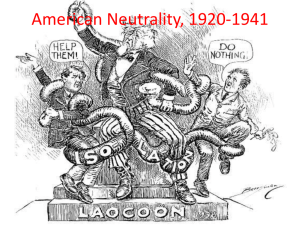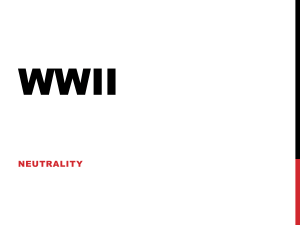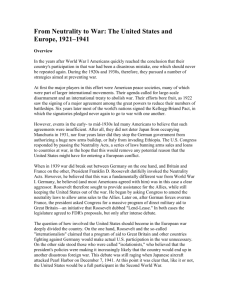F - Images
advertisement
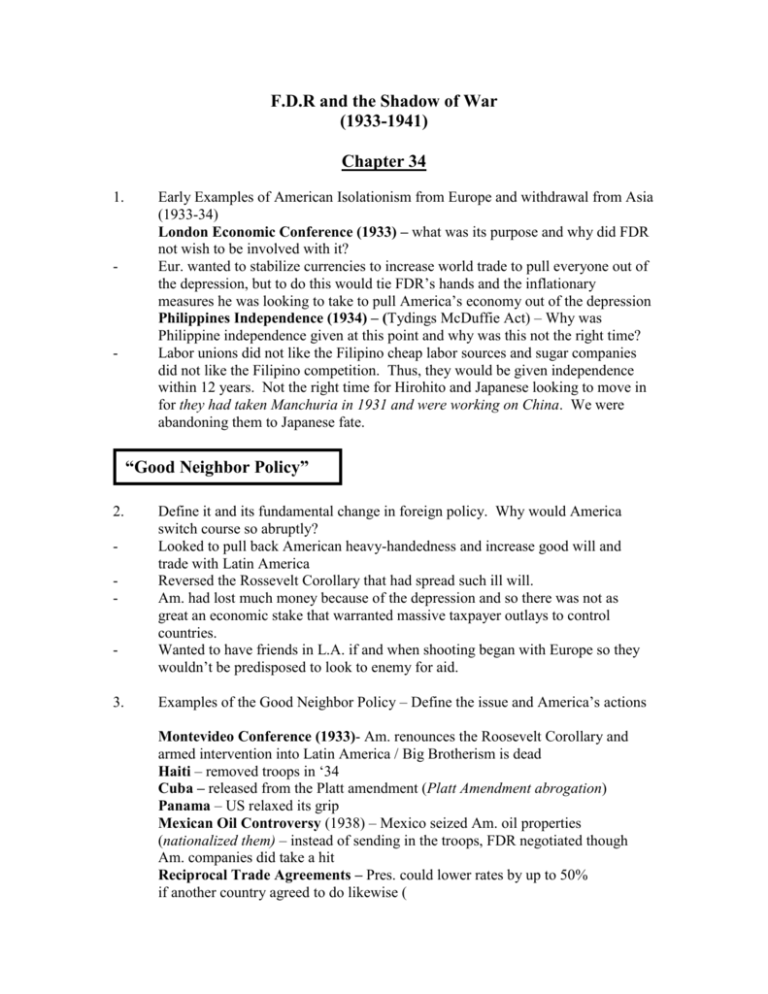
F.D.R and the Shadow of War (1933-1941) Chapter 34 1. - - Early Examples of American Isolationism from Europe and withdrawal from Asia (1933-34) London Economic Conference (1933) – what was its purpose and why did FDR not wish to be involved with it? Eur. wanted to stabilize currencies to increase world trade to pull everyone out of the depression, but to do this would tie FDR’s hands and the inflationary measures he was looking to take to pull America’s economy out of the depression Philippines Independence (1934) – (Tydings McDuffie Act) – Why was Philippine independence given at this point and why was this not the right time? Labor unions did not like the Filipino cheap labor sources and sugar companies did not like the Filipino competition. Thus, they would be given independence within 12 years. Not the right time for Hirohito and Japanese looking to move in for they had taken Manchuria in 1931 and were working on China. We were abandoning them to Japanese fate. “Good Neighbor Policy” 2. - - 3. Define it and its fundamental change in foreign policy. Why would America switch course so abruptly? Looked to pull back American heavy-handedness and increase good will and trade with Latin America Reversed the Rossevelt Corollary that had spread such ill will. Am. had lost much money because of the depression and so there was not as great an economic stake that warranted massive taxpayer outlays to control countries. Wanted to have friends in L.A. if and when shooting began with Europe so they wouldn’t be predisposed to look to enemy for aid. Examples of the Good Neighbor Policy – Define the issue and America’s actions Montevideo Conference (1933)- Am. renounces the Roosevelt Corollary and armed intervention into Latin America / Big Brotherism is dead Haiti – removed troops in ‘34 Cuba – released from the Platt amendment (Platt Amendment abrogation) Panama – US relaxed its grip Mexican Oil Controversy (1938) – Mexico seized Am. oil properties (nationalized them) – instead of sending in the troops, FDR negotiated though Am. companies did take a hit Reciprocal Trade Agreements – Pres. could lower rates by up to 50% if another country agreed to do likewise ( 4. - - What were the significances of the Reciprocal Trade Agreements? increased foreign trade with Latin America and established the free-trade international economic system that would be the watershed of the world following World War II. Established a mechanism for lowering trade that avoided the Senatorial logrolling that accompanied all tariff bills and always kept tariffs high since the Civil War American Neutrality and Isolationism 1933-1939 5. - - - 6. - US Neutrality – What did the Nye Senate Committee state in 1934? Why was this significant? bankers and munitions makers gained from the war and pulled the US into WW I US populace believed and supported legislation that would bar US involvement in any countries at war. Define the Neutrality Acts of 1935,1936 and 1937 No loans, arms to any country declared a belligerent by the President What is the ironic significance of these acts in comparison to previous Am. wars? Am. attempted to keep the world safe for neutrals in previous wars (except in Embargo Act of 1807) and keep freedom of the seas. “head in the sand” mentality of the isolationists prevented us from anything that might suck us in and that means abandoning the seas. Spanish Civil War – 1936-1939 Who was Gen. Francisco Franco? What happened? What was America’s response and why was it disastrous to the future events in Europe? military Fascist that had backing of Hitler and Mussolini to overthrow Sp. Republican government. Government was overthrown while the US stayed out and did not give supplies while the Ger. and It. supported Franco. Looked like US would stay out – message sent to Hitler 7. Totalitarian Aggression in the 1930’s:Define the following events that occur during this 1930’s - Japan – Marco Polo Bridge – (1937) – Japanese attack and start full-fledge war against the Chinese (since the 1931 invasion of Manchuria) “Quarantine Speech” - US Response – America called for positive endeavors to stop the aggressors (presumably by economic embargoes) Panay Incident – (1938) – Japan attacks Am. gunboat 2 killed, but apologize US Response? Nothing Italy - Ethiopia (p. 804) – (1935) – Mussolini invades Germany – 8. - ___ Rhineland (1935) ____Austria (1938) ____Sudetenland (1938) – takes this and the whole country of Czechoslovakia_______ Munich Conference (1938) – What was the issue and how was it resolved? What significant insight did Hitler gain from this? Germany wanted to complete his connection of all German people (at least this is what he said) by taking the Sudetenland Chamberlin (Bri.) and Fr. agree 3 weeks later he takes all of Czechoslovakia 9. Nonaggression Pact (1939) – Soviets and Ger. agree not to attack eachother and agree to divvy up Poland when Hitler attacks. (Soviets later take eastern parts of Poland) 10. Invasion of Poland (1939) How long did it take? 3 weeks (blitzkrieg ?) – “lightening war”) How did the Bri. and France respond? they declare war - 11. 12. Neutrality Act of 1939 How did it revise the earlier neutrality acts? “Cash and Carry” basis for provisioning the Allies – thus changes the belligerency status – Pres. would declare “danger zones” where Am. ships couldn’t travel. Fall of France When did it happen? What happened at Dunkirk? What was the US response to the fall of France and Britain being the only democracy left in Europe? What was the Havana Conference? June of 1940 Bri. army able to be saved from France. US preparedness campaign starts – 37 billion (5 times larger than any New Deal budget) was passed to build a 2-ocean Navy and huge airfleets. conscription law passed – 1.2 million and 800,000 reserves 21 L.A. countries and the US mutually agree to uphold the Monroe Doctrine end of the “Big Brother” concept - 13. - Polarization of America – define these two groups and their positions on getting involved in the war : Committee to Defend America by Aiding the Allies vs. America First Committee (“Fortress America”) CDAA – Give all aid “short of war” to the Allies to keep the war in Eur. AFC – Keep our arms here and boys alive. Make Am. so strong that the dictators would never attack. From Neutrality to Intervention – 1940 + 1941 14. - - 15. - 16. What was the Battle of Britain (1940)? - Germany’s air war against the Bri. What was the Destroyer-Bases Deal? Am. gave 50 destroyers to Bri. in exchange for 8 bases from Newfoundland to S.Am. How do FDR’s actions illustrate his thinking on the subject of neutrality? Did now want to subject this to a vote so he did it under the authority of being Commander in Chief – they needed aid. 1940 Election: Who was the Republican candidate? Wendell Wilkie What was the Republican platform? attacks the Roosevelt dictatorship – his heavy-handedness/inefficiencies of New Deal/ attempting a 3rd term/ stay out of the war What was the Democrat (FDR’s) platform? Stay out of war/keep Am. boys home/ Need his experience in this crisis What was the outcome? Am. believed they needed FDR to fend off Hitler Lend-Lease Act (1941)– Why did FDR propose it and what were its provisions? Why was it significant? 17. - Britain was broke and couldn’t afford. US would lend/lease armaments to the Allies and they would give them back after using them Prevented the great war debts that plagued nations after the war Hitler’s attack on Soviet Union – When did it take place and why did Hitler do this? June of 1941 – Ger. needed the oil and resources of the USSR and then he could turn his full attention to Britain 18. - Atlantic Charter (Aug.1941) – What was it and what were its provisions? Bri. and US agree an 8-point charter that would address the creation of a more democratic world: - self-determination for all peoples - regain gov’ts abolished by dictators - disarmament - permanent system of security (future UN) 19. U-Boat attacks – What was the “convoy system”? July, 1941-US Navy would convoy Am. ships carrying goods under Lend-Lease to Icleand and the Bri. Navy would pick them up there. What was significant about the Reuben James? US destroyer torpedoed – 100 lost (Nov. 1941) What change in merchant ship policies occurred because of it? They could arm themselves. – – 20. - Why did the Japanese attack Pearl Harbor? Either they would acquiesce to Am. demands and pull out of China and gain back some of their economic benefits with the US or they would stay and fight the Americans to gain territory. 21. What is the day that will “live in infamy”? Dec. 7, 1941 – attack on Pearl Harbor
